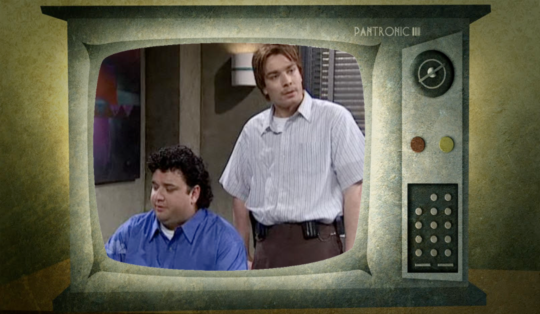Mildly adapted from my first Ignite talk
You might remember Nick Burns “The Computer Guy” from Saturday night live. He’s obnoxious, he’s hard to work with, and he treats you like an idiot. MOVE!

He’s a funny stereotype, but he’s pointing to a real problem. One that costs millions of dollars a year, and could be fixed with a ridiculous amount of ease. The thing is that Nick is a Computer Nerd, and nerds are notoriously difficult to work with.
By the end of the 1970s however, things started to change. Computers started infiltrating offices, and even homes by the mid eighties. Now you’ve got one in your pocket! By the end of this talk, your washing machine will probably have one as well.
And nerds make all this stuff work. Which means that they’ve come out of the basements, and tell you to get out of your chairs. This has given a traditionally lower power, low status group of folks a TON of power. Something they might have been used to.
And while most of us aren’t as bad as old Nick, we’re not that great. Because your washing machine is now running a rinse cycle followed by a defrag, any difficulties in working with Software Engineers costs real money.
I’ve seen millions of dollars flushed away on projects due to scope creep, miscommunication, bad project management, you name it. Most of the time it boils down to a simple communications barrier. The account manager on one side, trying to explain to the programmer on the other side what needs to happen. But whatever the breakdown in communications is here, the issue is a cultural one. The thing is that being a nerd is a culture in itself. Computer nerds even more so.
Think about the accountant manager doing the explaining. Just imagine the different hobbies, age ranges unique senses of humor that she deals with in her department. It’ll be different when she goes home, or out with her friends.Now think about the programmer. Not to generalize too much, but there won’t be two people in the whole place who couldn’t throw down on a bare knuckle Kirk vs. Picard argument. What’s more, when he goes home, most of his friends are Nerds, he plays on his computer more and argues about Star Trek online.
Nerd culture is incredibly tight. It crosses most other cultural and ethnic classes. And whenever two cultures come together, it’s a train-wreck.
And because of this, managing these folks is also really hard. Corralling programmers is WAY harder than herding cats. But any degree in management or weekend seminar isn’t going to teach you how to manage the TYPES of people in IT.
What I’m advocating here is a paradigm shift in Management Education. Because IT is such a distinct and separate culture, why not teach both Nerds and Normals about each other from a CULTURAL view point. If you were sending a sales team to Japan in order to close a big deal, you’d train them on how to bow and not stick their chopsticks in their rice. The Japanese would be practicing shaking hands and smiling for weeks before your team got there.
Why don’t we just treat IT Management the same in Business Schools and the corporate world? Teach Normals how to handle aloofness and chipped shoulders. Teach them how to do lots of showing, and ask lots of questions. Then take the nerds and teach them some life lessons about real people. Maybe Mavis who has worked in the packing warehouse, with no air-conditioning, for thirty years, is not just an idiot. Maybe she knows something you don’t. Something that could make your system work better.
Nerdom is a relatively young culture. And we work in even a younger field. With a little bit of Energon, and a whole lot of luck, we can make this happen.